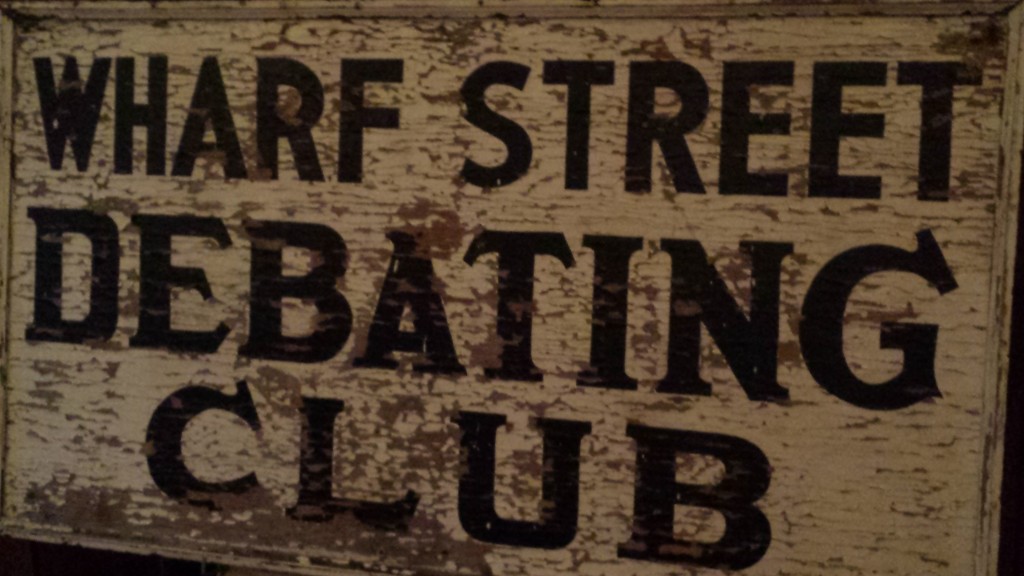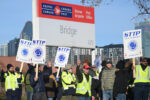The Wharf Street Debating Club: A History

The old sign was salvaged when the old club house was demolished. It was presented at the 99th Wharf Street Debating Club Bun Feed. Photo by Katie Coleman
BELLEVILLE – It’s been a long-standing tradition in Belleville to put candidates for municipal government in the hot seat. The Wharf Street Debating Club Bun Feed has been a staple of elections in Belleville since 1913. Candidates for mayor and council would sit nervously in front of boisterous, often drunk, men in an old boathouse that was in danger of falling into the bay. The crowd would then rip the candidates apart.
The tradition comes from the area that used to be Foster Ward, the southeastern part of the city that hugs the Bay of Quinte. This is where the working class lived. It was where many factories were located; factories that produced goods that were shipped all over. It was these factory workers and shiphands that formed the Wharf Street Debating Club. The club started as a place for these men to gather, drink, and debate current events. Another factor in the formation of the club was the people of Foster Ward felt underrepresented in city politics. The first recorded Bun Feed took place in 1913, according to a book by local author C. W. Hunt called Dockside Democracy: Women, Foster Ward & and the Wharf Street Debating Club.
Chris Malette is the retired city editor of the Belleville Intelligencer. He watched political candidates get roasted for much of the 1980s and 90s and offered some insight into the workings of the club.
“The idea, really, is to knock them down a peg and have some fun at their expense,” Malette said.
It was the working class people that invited these politicians that had much higher social standing to these events, according to Malette. It was also their way of having more of a say in the goings-on of city council. The club entertained some big characters in the history of Belleville such as Stu Meeks. Meeks was an outspoken city alderman who served on Belleville city council until his death in 2002 – a total of 27 years. C. W. Hunt’s book summed him up as:
“Belleville’s most colourful councillor is unquestionably Stu Meeks. A burly veteran of the Korean War, his public utterances have kept local newspaper scribes busy quoting his controversial opinions.”
Much to the dislike of local feminists, women were not allowed into the Wharf Street Debating Club. When there were female candidates they were asked to wait in the hall and were led into the club to speak their piece before being escorted out again. The content of the Bun Feed was seen as too harsh and vulgar for women. It wasn’t until 1988 that the rules changed. All thanks to a brave young reporter who worked for the Intelligencer at the time.
Julia Drake enlisted the help of the Belleville Theatre Guild to transform into Bill Blake in order to be let into the club. She was accompanied by a male Loyalist College journalism student and posed as his classmate.
“The club was packed to the rafters and full of smoke and bawdy banter. Soon after I signed in as Bill Blake, my presence was detected. Rather than toss me out on the street, club officials decided to let me stay. From that night on, women were allowed to attend club gatherings,” Drake said in an email.
Drake felt that, since it was the 1980s, change was long overdue.
“It bothered me that male candidates were given an edge by being allowed to socialize with voters throughout the evening. I welcome lively political debate, but I believe that debates should be fair and inclusive.”
The club recently hosted it’s 99th Bun Feed at the historically high-class Belleville Club on Pinnacle Street. The club had to move the Bun Feed after the original location was demolished in 2013.
“It’s really a sweet irony,” said Malette. “Here you have the Wharf Street Debating Club, which is ‘wharf rats’ as they were known, invading the Belleville Club.”
There was a fairly large turn out of men and women as well as a few younger spectators. The Club’s future is uncertain. At the Bun Feed, Malette as the Master of Ceremonies announced that it would likely be the last one. But afterwards, many members of the community came forward and pledged their support to keep the club going, said Malette.
“It’s just a super unique thing about Belleville politics. You won’t find it anywhere else in Canada.”
 Print This Post
Print This Post






